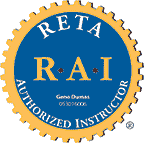

SCS Tracer Environmental has a diverse staff of instructors who provide practical, cost-effective ammonia refrigeration training and certification review courses. Training can be provided on-site, at our new training classroom in Oakdale, Minnesota, or at one of our nationwide sessions. Our training programs incorporate RETA, IIAR, manufacturers, field materials, facility-specific standard operating procedures, and/or piping and instrumentation diagrams.
Ammonia Refrigeration Operator Training Programs use the applicable RETA Industrial Refrigeration (IR) 1 & 2 manuals, which participants keep at the conclusion of the classes. These intensive four-day classes are provided in locations across the nation (convenient for attendees to participate locally) or in our new Minnesota classroom.
Operator I: This course is based on the materials in RETA IR-1 Course and is designed as an entry-level training program for a refrigeration operator, manager, and/or safety personnel with limited refrigeration training, or experienced operators who have never received the basic fundamentals of refrigeration principles. Operator I training is also offered in Spanish.
Operator II: This course is based on the material in RETA IR-2 Course and is designed for a refrigeration operator, manager, and/or safety personnel who have successfully completed the Operator I class and have a desire to further their knowledge in industrial refrigeration systems and principles using ammonia as a refrigerant.
PSM/RMP Introduction Training Class uses ammonia refrigeration-focused material specific to your PSM/RMP program and facility, RETA, IIAR, manufacturers, and field materials, as well as facility-specific standard operating procedures. We highlight the responsibilities of the various PSM/RMP Team Members that may include, but not be limited to, maintenance, safety, management, environmental, and/or facilities personnel:
PSM/RMP Advanced Training Class is geared for experienced PSM Program Managers, Plant Managers, ammonia refrigeration facility compliance personnel, and safety-EHS staff who want a detailed review of the more complex regulatory requirements included in the PSM and RMP regulations. The class focuses on the complex details of the following elements: Process Safety Information (RAGAGEP), Standard Operating Procedures, Management of Change (Project planning through Pre Startup Safety Review (PSSR)), and Mechanical Integrity.
RETA CARO/CIRO Review Classes are intensive training designed for operators who are pursuing their RETA CARO or CIRO certification. Each course includes a review of the pertinent materials. During Day 2, participants receive a voucher to take the RETA Practice Test, a $60 value. Our instructors use the practice test results to customize the curriculum on Day 3 to focus on the more difficult concepts.
 Refrigeration Training and Certification Programs
Refrigeration Training and Certification ProgramsSCS has a diverse staff of certified engineers, scientists, and technicians who provide practical, cost-effective training on-site or in one of our nationwide sessions. We use training materials from RETA, IIAR, manufacturers, and field experience, as well as facility-specific standard operating procedures. See our training schedule and complete information here.
SCS’s Refrigeration Operator I & II Training Programs use the applicable RETA Industrial Refrigeration (IR) 1 & 2 manuals which are included for the duration of the classes. These intensive four-day classes are provided in locations across the nation; convenient for attendees to participate locally.
Operator I: Designed for the beginning refrigeration operator, manager, and/or safety personnel with limited refrigeration training.
Operator II: Designed for the refrigeration operator, manager, and safety personnel who have passed the Operator I class and have a higher level of experience and knowledge in industrial refrigeration systems using ammonia as a refrigerant.
PSM/RMP Introduction Class: Training course using ammonia refrigeration-focused material specific to your PSM/RMP program and facility using RETA, IIAR, manufacturers, and field materials as well as facility-specific standard operating procedures. We highlight the responsibilities of the various PSM/RMP Team Members that may include, but not be limited to, maintenance, safety, management, environmental, and/or facilities personnel:
PSM/RMP Advanced Class: Training course for experienced PSM Program Managers, Plant Managers, facility compliance personnel, and safety-EHS staff who want a detailed review of the more complex regulatory requirements included in the PSM and RMP regulations. The class focuses on the complex details of the following elements: Process Safety Information (RAGAGEP), Standard Operating Procedures, Management of Change (Project planning through PSSR), and Mechanical Integrity.
RETA CARO/CIRO Review: This intensive training is designed for operators who are pursuing their RETA CARO or CIRO certification. Each course includes a review of the pertinent materials. During Day 2, participants receive a voucher to take the RETA Practice Test. Our instructor reviews the test results and customizes Day 3 to incorporate material that was found to be deficient within the testing.
See our training schedule and complete information here.
A few years ago, an engineer working for a“friend’s plant” chose to replace their evaporative condenser with an adiabatic condenser. On the surface, the choice seemed like a good idea since adiabatic condensers often provide higher heat rejection with lower water and electricity usage. The condenser was purchased and installed, but all was not well. When not carefully considered, replacing equipment or control programs can have unforeseen consequences such as negative impacts on operational safety.
In this real life example the author examines what information would have made a big difference and significant savings had the right questions been asked.
Click to read this article and others written for those in industries using ammonia refrigeration.